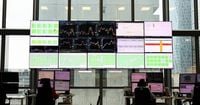The Paris Bourse witnessed a significant downturn on April 4, 2025, as the CAC 40 index plunged, erasing all gains made since the beginning of the year. The decline was primarily driven by escalating trade tensions between the United States and China, which have resulted in punitive tariffs affecting a wide range of goods.
By approximately 14:25 local time, the CAC 40 had dropped by 3.96%, losing 300.72 points to settle at 7,298.26 points. This marked a decline of 1.09% since January 1, 2025, signaling a troubling trend for investors.
Analysts from Natixis commented on the situation, stating, "Europe is expected to announce retaliatory measures soon, and China has already reacted with a 34% increase in tariffs on American imports, fueling the escalation." The new tariffs imposed by President Donald Trump on the previous Wednesday are particularly harsh for China, which now faces additional duties of 34%, bringing the total to a staggering 54% when combined with existing tariffs.
China's Ministry of Finance confirmed that it would impose these additional tariffs on U.S. products starting April 10, 2025, in response to the U.S. tariffs. The situation has created a climate of uncertainty, with fears of a potential recession looming over the U.S. economy.
Fawad Razaqzada, an analyst at City Index, noted, "The hope of reaching some agreements before April 9, when the U.S. tariffs take effect, persists. However, as we approach this date, it seems that the trade war is only intensifying, with China—and soon other countries—taking countermeasures."
Amid this turmoil, French President Emmanuel Macron urged French companies to suspend investments in the United States, a move that reflects the growing concern over the impact of U.S. trade policies on global markets.
The repercussions of the tariffs were felt across various sectors, with significant declines in major companies. Shares of Saint-Gobain fell by 8.64%, ArcelorMittal by 8.61%, Schneider Electric by 7.11%, Airbus by 5.70%, and Thalès by 5.23%. TotalEnergies also experienced a decline of 4.40%. In contrast, some companies like Danone and Air Liquide saw modest gains, rising by 0.74% and 1.24%, respectively, as they appeared less affected by the tariff issues.
The broader implications of these tariffs extend beyond individual companies to the global economy. According to Guillaume Chaloin, director of equity management at Delubac AM, "The fears of a recession mean less industry and less oil consumption," which could have dire consequences for industrial and oil sector stocks.
In a sweeping change to U.S. trade policy, President Trump has implemented a base tariff of 10% on all imported goods, with exceptions for certain sectors like pharmaceuticals and semiconductors. The new tariffs on China and other nations, including the European Union, Japan, and South Korea, have raised concerns about the potential for inflation and a slowdown in economic growth.
UBS Wealth Management has projected that the U.S. economy could slow down, with growth in 2025 potentially falling to around or below 1%. They also anticipate that the Federal Reserve may need to cut interest rates by 75 to 100 basis points by the end of 2025 to counteract the economic fallout.
As the situation continues to evolve, the CAC 40 remains under pressure, with a weekly loss of 8% and heading toward its worst week since the dissolution of the French National Assembly in June 2024. The Euro Stoxx 50, which tracks major European stocks, has also seen a significant drop, falling 4% to its lowest level since January 3, 2025.
Wall Street mirrored these declines, with the Dow Jones falling nearly 4% and the Nasdaq suffering a loss of almost 6%, marking its worst session since March 2020. Tech giants like Meta, Apple, and Tesla have seen substantial declines, with Nvidia experiencing a drop of 6.3% as concerns about demand and supply chain disruptions mount.
In the automotive sector, European car manufacturers faced steep declines, with Stellantis down 7.9%, Mercedes down 5.6%, and Volkswagen down 4.5%. Even Japanese automakers like Toyota and Honda reported losses of 4.4% and 5.5%, respectively. The impact of these tariffs is already causing some manufacturers to halt production and increase prices on certain models.
On the commodities front, oil prices dropped sharply by 7% as fears of reduced demand due to the trade war intensified. The OPEC+ decision to triple oil production in May has further compounded these concerns, leading to a significant decrease in crude prices.
As the markets react to these developments, investors are keeping a close eye on potential agreements to mitigate the impact of the tariffs. Jim Reid, an economist at Deutsche Bank, highlighted the uncertainty surrounding future negotiations, stating, "The big question is how the U.S. trading partners will respond to these tariffs. That will determine the impact on the global economy."
In summary, the trade tensions between the U.S. and China, exacerbated by Trump's aggressive tariff policies, have created a turbulent environment for global markets. The ramifications of these policies are likely to be felt for months to come, as companies and economies grapple with the fallout from this unprecedented shift in trade relations.






